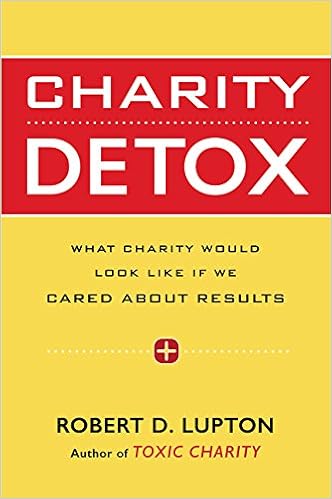Book review: Charity Detox
by Robert D. Lupton
★★★★★
The author of Toxic Charity is at it again. Lupton insists that most of the work we do in the name of charity does more harm than good. Proclaiming that the only effective charity is the kind that asks more from those being served, rather than less, he lifts capitalism onto a pedestal and incriminates socialism and philanthropy as building dependency rather than affirming that the recipient also has something of value to offer.
Lupton’s arguments are convincing. His focus is primarily on poor communities, and his conclusion is that the best thing you can do for a person is give him or her a good job. Why capitalism? Only for-profit businesses produce enough wealth to create enough jobs to lift a community out of poverty.
Perhaps the worst thing you can do is give a person a handout. Lupton is presumably a Christian, but he’s not a fan of mission trips. They don’t contribute to local economies: mission trippers come to serve, not consume. They spend their money on airfare and projects rather than on merchandise and excursions. They flood local consumers with free goods, naively undercutting local businesses, the very system locals depend on for their livelihood. The research of a friend of Lupton showed that between 1992 and 2006, a half million workers in Nigeria lost their jobs due to the inflow of donated clothing. But perhaps even worse is the effects of repeated “charity”:
Feed a person once, it elicits appreciation.
Feed him twice, it creates anticipation.
Feed him three times, it creates expectation.
Feed him four times, it becomes an entitlement.
Feed him five times, it produces dependency.
So what can we do for the poor? For one, don’t denigrate big business or the drive for wealth. The hope for such communities is investors, business people with the means and knowledge to build jobs, putting the poor on a path to self-fulfillment. Our church missions should be replaced with fact-finding business excursions.
I can’t say I agree with everything in Lupton’s ideology, but he does make me think differently about some things … and he certainly has the lifelong get-your-hands-dirty experience to back up his findings.
Publisher, © 2015, 196 pages
ISBN: 978-0-06-230726-2












 354 Circles
354 Circles
 603 Goodreads Friends & Fans
603 Goodreads Friends & Fans

 Hello! I'm an author, historical Jesus scholar, book reviewer, and liberal Christian, which means I appreciate and attempt to exercise the humanitarian teachings of Jesus without getting hung up on any particular supernatural or religious beliefs.
The Bible is a magnificent book that has inspired and spiritually fed generations for thousands of years, and each new century seems to bring a deeper understanding of life’s purpose. This is true of not only Christianity; through the years, our age-old religions are slowly transforming from superstitious rituals into humanitarian philosophies. In short, we are growing up, and I am thrilled to be riding the wave.
I avidly read all thought-provoking religion titles. New authors: I'd love to read and review your book!
Hello! I'm an author, historical Jesus scholar, book reviewer, and liberal Christian, which means I appreciate and attempt to exercise the humanitarian teachings of Jesus without getting hung up on any particular supernatural or religious beliefs.
The Bible is a magnificent book that has inspired and spiritually fed generations for thousands of years, and each new century seems to bring a deeper understanding of life’s purpose. This is true of not only Christianity; through the years, our age-old religions are slowly transforming from superstitious rituals into humanitarian philosophies. In short, we are growing up, and I am thrilled to be riding the wave.
I avidly read all thought-provoking religion titles. New authors: I'd love to read and review your book!
 Hi! While Lee writes the articles and reviews the books, I edit, organize, and maintain the blog. The views expressed here are Lee's but I'm his biggest supporter! :-)
Hi! While Lee writes the articles and reviews the books, I edit, organize, and maintain the blog. The views expressed here are Lee's but I'm his biggest supporter! :-)
Connect With Me!